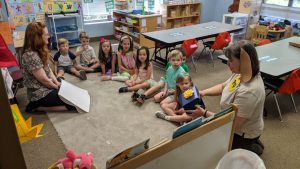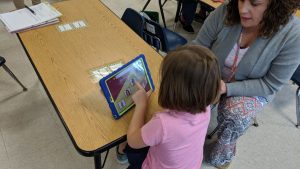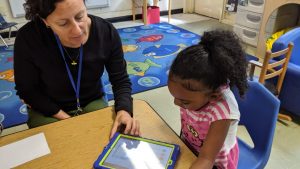Improving Early Childhood Assessment is a Matter of Equity
By Jeanna Baxter White

In 1998, businessman and philanthropist Allen Mebane established the Mebane Foundation to support innovative educational endeavors. Since its inception, the Foundation has served as a catalyst by granting more than $25 million to educational program partners across the state while simultaneously leveraging that amount in public-private partnerships. The result? More than $30 million has been injected into innovative educational initiatives. To celebrate our 25th anniversary, we will be resharing some of the wonderful programs that are preparing children for life through literacy.
Mebane Foundation President, Larry Colbourne, learned about Dr. Tammy Kwan and Cognitive ToyBox through a 2017 grant to 4.0 Schools, a non-profit incubator that finds, trains, and invests in passionate people solving the most critical challenges in education. Cognitive ToyBox enables a direct assessment of early language, literacy, math, and social-emotional skills. Using a touchscreen device, students play one assessment game per week for an average of five minutes, and teachers have access to NC standards-aligned reports that support them in planning for instruction and supporting individual student needs. Recognizing its applicability to the preschool portion of DavieLEADS, he shared the program with Peggy Nuckolls, director of preschool programs for Davie County Schools, and Stephanie Nelson, Davie County Schools’ preschool collaborative teacher. Davie County Preschools began piloting CTB Assess during the spring of 2018 and has been pleased with the information it provides ever since.
“Over the past several years, we have been able to use Cognitive Toy Box in our classrooms to capture the current progress of our students that is objective vs subjective in nature. This data, along with teacher observations and anecdotal notes, enables teachers to identify consistent areas of need where students need more support. With the cumulative data, our teachers are equipped to plan lessons based on the classroom and individual student needs,” explained Nuckolls.
Nelson added, “Our teachers have shared that it’s very helpful because their assistant can complete Cognitive ToyBox data collection with students, and they can access it later. For example, the teacher can be collecting anecdotal data while leading small groups, and the instructional assistant can work on Cognitve ToyBox during centers. The instructional assistants have noticed trends like we need to work on recognizing a certain emotion, or most students still can’t identify a triangle, etc. It helps both the teacher and the instructional assistant engage in more purposeful educational play and conversations with students in the classroom.”
Colbourne considers Cognitive ToyBox well worth the investment. “The Mebane Foundation has been a funding partner in Davie County with Tammy Kwan and Cognitive ToyBox for many years. Her direct assessment tool continues to be used in all Pre-K classrooms in conjunction with Teaching Strategies GOLD, but to be honest, from my personal observation, I believe Cognitive ToyBox could be used as a standalone assessment. It’s engaging for the children, it’s quick, it’s individualized, and kicks out data that is invaluable to the teacher. Not to mention, in my opinion, it takes a lot of the guesswork out of an assessment process that historically has been handled in a very time-consuming observation setting.”
Below, Dr. Kwan discusses the value and importance of high-quality early childhood education.

By Dr. Tammy Kwan
Across the country, dedicated early childhood teachers are building positive, supportive relationships that help each young learner develop on an individual pathway and explore their interests through joyful, play-based activities.
While high-quality early learning experiences like these reach many students, they should be the standard for all children. Research shows that the quality of an early childhood program is the strongest predictor of school readiness and life outcomes. As state-level leaders remain eager to ensure that investments in early childhood education pay off down the road, they should look to quality as their priority. Without quality, programs will not achieve their desired outcomes. One of the ten quality standards set by the National Association for the Education of Young Children is early childhood assessment. Why is early childhood assessment important? Because if you don’t measure it, you can’t improve it.
Assessment determines the type of instruction a child receives. If a child is accurately assessed in their early childhood education setting, they can receive instruction that is aligned with their development, leading to engaged and joyful learning environments. If the opposite happens, children could begin to disengage from education in the earliest years.
Today, the primary method of early child assessment, through teacher observations, is known to be burdensome to teachers and at risk of implicit bias. And yet, nearly 60% of states have adopted an observation-only child assessment tool or provided an approved list of assessments that only has observation-based tools for early childhood. Consistent with the literature, a study with 11 teachers in upstate New York, conducted by Dr. Claire Cameron and Dr. Megan McClelland, found that teachers tended to rate Black children as lower in terms of executive functioning and non-Black children as higher in terms of executive functioning. Cognitive ToyBox’s direct, game-based assessment did not show that difference (paper in prep). Game-based assessment can give teachers the information they need to provide more developmentally appropriate instructional support.
Game-based assessment can be an especially helpful supplement for children who have learning differences. Dawn Wilson, a Pre-K teacher in Wayne County, NC, shared, “especially with my children with special needs, the games showed that they know more than we thought they did.” Another advantage of game-based assessment is that teachers are able to get detailed information on a question-level detail, which they can use to further individualize instruction. “The data from Cognitive ToyBox has changed a lot of conversations for us for the better,” said Dr. Stephanie Hinton, Director of Early Childhood at Oklahoma City Public Schools. “Rather than focusing on our class average and mastery score, we’re now having conversations about how 50% of children in the building can’t recognize the letters in their own name, and having dialogue around how to improve that.”
Finally, game-based assessment helps to increase the accessibility of assessment. Observation-based assessment tools are time and resource intensive, taking on average 20-60+ minutes per day for teachers. As a result, only early childhood programs that have an assessment budget and formalized professional development time built into the schedule can have access to these tools. Family child care and smaller center-based providers, which provide support for more than 30% of children under 5 in the US, are often left behind. To ensure that all early childhood education programs can meet quality standards, we need to ensure that assessment tools are accessible, usable, and affordable in all early childhood education settings. Game-based assessment can help by providing cost-effective tools that take less time to learn and implement but still yield accurate, useful data for family child care providers and small center-based providers. The time-savings benefit could also be beneficial to larger early childhood programs that are facing unprecedented levels of turnover from a combination of low wages and teacher burnout.
The federal Head Start Early Learning Outcomes Framework, which also shapes state Pre-K assessment and kindergarten entry assessment policies, mandates that “a program must conduct standardized and structured assessments, which may be observation-based or direct.” However, to ensure equitable assessment, programs should be conducting observation-based and direct assessments on an ongoing basis. Game-based technology makes it possible to design direct assessments that are play-based and developmentally appropriate for young learners.
As state-level leaders, freshly awarded $300 million in federal Preschool Development Grants, develop their strategy for quality, they can consider adding direct assessment into the mix. Direct assessments in early childhood have the strongest predictive relationship to later achievement (National Research Council, 2008). Moreover, recent advances in assessment and game-based technology make it possible for direct assessment to span whole child development, be developmentally appropriate, and be easy to implement for teachers. Most importantly, having access to direct assessment data for early learners will enable state-level leaders to more strategically support school readiness, helping every young learner reach their full potential.
In 2023, the NC Child Care Commission approved Cognitive ToyBox as a stand-alone assessment provider in NC for birth through four-year-old classrooms. Cognitive Toybox’s observation-based tools are approved for birth to three. Its observation and game-based tools are approved for 3 and four-year-olds.
About the author: Dr. Tammy Kwan is the CEO of Cognitive ToyBox, a company she co-founded in 2015. Tammy is the driving force behind her organization’s partnerships with leading researchers, receiving support from funders including the National Science Foundation, the Department of Education, and the Mebane Foundation in NC. The company’s flagship product – a combination observational and game-based early childhood assessment – supports some of the largest school districts in the country, including Los Angeles Unified. Tammy holds an EdD and MBA from New York University and a BA in Psychology from Stanford University.










